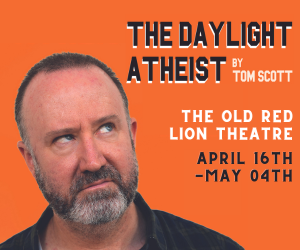In 2005 it was revealed that author JT LeRoy was in fact a hoax – written by Laura Albert but played in person by her sister in law Savannah Knoop. At this year’s Book Festival, Laura Albert attempted a therapy session with psychotherapist Susie Orbach in front of a live audience, talking about her eating disorder, relationship with her son, and the power of her pseudonym. Broadway Baby’s James T. Harding reports.
Manic anxiety about food has become an international public health emergency
The stand-out event from my time at EIBF this year was In Therapy with Susie Orbach: Laura Albert. The concept was for the two women, who had never met before the event, to attempt a short therapy session just as they would if they were a new therapist and client in real life – ignoring the audience as best they could. (As if.)
I was as uncomfortable witnessing the session as I was fascinated by it, doubly so as the press pass weighing around my neck made me as much psychological pornographer as voyeur. It would have fit right in at Summerhall.
Laura Albert is famous for her creation of the literary persona JT LeRoy. Writing as JT, she was able to tackle tough subjects like poverty, drug use, emotional and sexual abuse. At first, Albert communicated with the wider world by phone and email. By 2001, Savannah Knoop, Albert’s sister in law, was making public appearances as the fake author, with Albert herself appearing as JT’s assistant. Things came to a head in 2005 when Albert was ‘outed’ (her own word choice) by the press, and then in 2007 when she was sued by Antidote International Films for signing a film option under an assumed name. A biographical documentary, Author: The JT Leroy Story was eventually brought out by a different film company in 2016.
In therapy, Albert spoke primarily about her compulsive overeating, a problem she’s wrestled with since her care-home upbringing. Her diet is both a coping mechanism and a curse. Sometimes, controlling her diet sublimates her self-destructive instincts; sometimes her relationship with food causes her to hurt herself and others.
Susie Orbach is the ideal person to act as therapist. The author of the iconic Fat is a Feminist Issue: the Anti-diet Guide to Permanent Weight Loss (Paddington Press, 1978) was a calming presence during the therapeutic part of the event, but in the discussion afterwards she let some of her frustration with contemporary attitudes towards food and body image come out to play. Manic anxiety about food has become an international public health emergency, she says, maintained for corporate profit by the fashion and food industries.
Watching from the stands, I was struck by a certain crossover between some of Orbach’s therapeutic techniques and my own practice as a journalist. In particular, a technique Larry Bartleet and I call ‘black holing’, which involves staying as silent and receptive-looking as as possible in order to make the subject feel socially obliged fill the void with interesting material.
In journalism, black holing has the dual purpose of getting any publicist-prepared material out of the way and helping the subject discover what they really have to say. In therapy, as Orbach explained in the post-show discussion, it lets the client’s avoidance tactics run out of steam.
Orbach seemed keen to let Albert set the agenda as much as possible for the first half of the session, then attempted to focus in on an angle rooted in the present and the specific – another important technique in journalism. She did this more than she would have in real therapy, she explained afterwards. The presence of the audience made her talk more than she would have in a normal first meeting: she wanted to find a strand for the audience to take away with them.
In response to an audience question, Orbach explained that overcoming any initial dislike of a client is part of the work of a therapist, which is to connect with and appreciate the problems of another person. ‘It’s impossible to have a client-patient relationship without falling for them.’
That, I suppose, is where the crossover with journalism ends.










